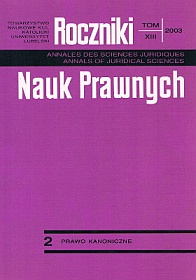Celibat wymogiem do święceń według obowiązującego prawa kościelnego
Abstrakt
The paper is a kind of yet another reflection on the mystery of people offering themselves to God. By responding to the voice of vocation, they at the same time accept the condition which they are obliged to fulfil living as celibates. Celibacy has had a long and complex history. Its requirement was introduce at the Synod of Elvir, ca. 300-306. Principally, the paper discusses the following issues: 1. Introduction in which it is stressed that the subject matter of celibacy in the Latin Church is of topical importance and how celibates' life is pout in danger. It is noteworthy that the topic of celibacy is taken and discussed from many points of view. 2. Celibacy in the teaching of Vatican Council II at which celibacy was presented as a gift from God for those who sacrifice themselves to God in their service. The Priesthood summons to higher perfection, as the priest - by receiving the sacramental vows - resembles Christ the High Priest. The Council speaks about celibacy that the virtue of chastity is a sign and stimulus of pastoral love and a special source of spiritual fertility in the world. It is through virginity or celibacy that priests are sacrificed to Christ for new and exceptional reasons. Their heart is undivided with Him, and it is easier for them to sacrifice themselves in Him and through Him for the service to God and people. Thereby they are more effective in their service to His Kingdom and to the supernatural work of regeneration. Thus they become more suitable to accept the broader fatherhood in Christ and His mission. Initially, celibacy was recommended in the Latin Church by the law imposed on all who were to be ordained. The dogmatic Constitution of Vatican Council II Lumen Gentium, John Paul II's adhortation Pastores dabo vobis, the Bible, Paul VI's encyclical Sacerdotalis caelibatus, the Synod in Elvir and the Synod of 1971 were the main sources for this paper. The author used also various studies written by theologians and canonists.
One should remark that celibacy does not result from the very sacramental priesthood, but is a charisma given to the Church by the power of the Holy Spirit. In his letter to the Priests in 1979, Pope John Paul II writes about three motivations on behalf of celibacy in the Church. They are as follows: theological, ecclesial, and anthropological. The point is to justify celibacy, that is a gift from God, and then that it is to be a source for human integral development, and, ultimately, that it is accepted by priests on behalf of a more fruitful service to the fellowship of the Church. Celibacy in the church is a treasure carried and held in earthen vessels. On the one hand we can see its power as it is given from God, and at the same it shows human weakness, for the man, because of his or her own weakness, never grows to this dignity of life to with God every day. One she understand it as a gift and attitude in giving oneself to God for the service the to brothers and sisters. One observes in the contemporary world and the Church a crisis in keeping to celibacy. The paper mentions it as well. 3. Another point is the historical outline of how celibacy for the clergy was introduced in the Church. 4. Another part of the paper deals with requirements of celibacy in the code projects and in the code of John Paul II. In canon law celibacy is a requirement taken by candidates to higher vows in the Catholic Church. This occurs at the moment diaconal vows, when the future deacons swear to live in celibacy to their bishop. There are references to code schemes from various versions of John Paul II's code, and, finally, the norms of John Paul II's Code have been discussed. They deal with the issue of celibacy in the life of priests and seminarians of the Latin Church. 5. Eventually, the paper lays stress on the need for an integral formation designed for candidates to celibacy. John Paul II in Pastores dabo vobis says that each candidate to the priesthood should feel like an indispensable and irreplaceable advocate of his appropriate formation to life in celibacy. The freedom of living in celibacy means that somebody has entrusted himself to the Holy Spirit and allowed Him to guide his own person in everyday life. The gift of celibacy is to be confirmed by the intimate unity of the alumnus with Christ.
Copyright (c) 2003 Roczniki Nauk Prawnych

Utwór dostępny jest na licencji Creative Commons Uznanie autorstwa – Użycie niekomercyjne – Bez utworów zależnych 4.0 Międzynarodowe.


